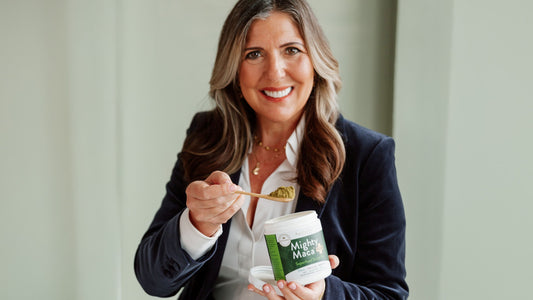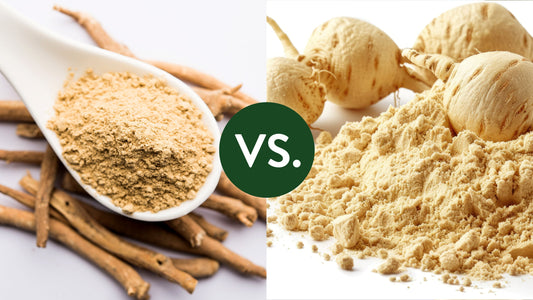I’ve been through menopause – not once but twice! So I know the agony, frustration, and fear you feel during this life transition. My experience – and how I healed myself - prompted me to create my Magic Menopause online program to help women like you. I speak and lecture frequently about menopause because I know you can truly thrive through this sometimes challenging stage of life. And I just have to share, I am offering a free webinar this Saturday, "3 Secrets for Creating Hormone Harmony" a in-depth lecture that will help guide you and help you through this phase in your life.
Ladies that have been through Magic Menopause program in the past have had terrific results. When I hear “hot flashes are almost gone” or “no more skin flare ups” or “I can finally sleep” or “I’ve got my figure back” and other success stories, I get really excited! Especially because the healing is based on diet, NOT on taking prescription drugs or other symptom-masking medical interventions.
Hands down, the very best diet for menopause is a keto-alkaline diet, or Keto-Green™, as I call it. This nutritional strategy combines ketogenic nutrition and alkaline eating. For soothing and eliminating menopause symptoms, the alkalinity part of the diet is especially important.
What exactly is an alkaline diet? Not to get into a chemistry lesson (well, maybe a brief one!), the alkaline diet emphasizes vegetables (especially green veggies), legumes, nuts, seeds, herbs, and some fruits with the aim of maintaining an optimal pH level in the body.
pH is an acronym for “power of hydrogen,” the measurement of the total hydrogen ion concentration in a solution. The pH scale ranges from one to 14. Seven is neutral. Anything higher than seven is alkaline (base); anything lower than seven is acidic (acid).
Referring to that scale, human blood is quite stable at about 7.4, making it alkaline. The ocean has a pH of about 8.1. The optimal pH for a pool is 7.4, about the same pH as human eyes and your mucous membranes.
But when you measure the body’s acid-alkaline state, you’re not talking about blood pH. Instead, you’re checking urinary pH, which can fluctuate based on diet, hydration, stress, and other factors, and provide clues to cellular health, mineral status, and lifestyle consequences. An alkaline state is healthier for your body and helps protect against diseases, says a 2012 review study published in the Journal of Environmental Health. A urinary pH of 7.0 or above indicates healthy cells.
An alkaline diet also avoids acidic foods like meat, cheese, grains, breads, pasta, sugar, artificial sweeteners, wheat products, processed carbohydrates, and sodas. The typical American diet is too high in these acid-producing foods. When your bodily fluids are too acidic, a situation known as “acidosis” is created. Acidosis occurs when your kidneys and lungs can’t keep your body’s pH in balance. Mineral levels are depleted, and chronic inflammation can set in. Staying alkaline prevents these consequences.
Now, how does alkalinity improve your menopause symptoms? In several spectacular ways. An alkaline diet:
Improves hot flashes. Up to 45 percent of women experience hot flashes for up to five years after menopause, and for some women the symptoms can last more than 10 years. In a study of more than 6,000 women, researchers in the American Journal of Clinical Nutrition found that those who ate a keto-alkaline diet were 20 percent less likely to experience hot flashes and night sweats than those who ate a diet higher in sugar and carbs. That’s because the main hot-flash triggers are blood-sugar fluctuations (which increase insulin levels) and stress (which raises cortisol levels).
Improves bone health. One of the ways your body maintains its near neutral pH is to draw on alkaline minerals stored in the body. Unfortunately, this can mean extracting calcium and magnesium reserves from the skeleton, thus demineralizing and weakening the bones, possibly leading to osteoporosis. What’s more, an acidic diet may actually decrease bone density if you don’t balance that acidity with alkaline-rich foods. An alkaline diet, however, is high in minerals, and helps counteract bone weakening, and prevents osteoporosis.
Prevents magnesium deficiency. Magnesium is one of the most important minerals in the body. Among other things, it helps activate vitamin D, which is involved with calcium absorption. You don’t want to be deficient in magnesium, especially during menopause. A short supply of this mineral can aggravate menopause symptoms such as anxiety, sleep issues, and headaches. It can also cause back pain. Ensuring that you obtain an adequate supply magnesium allows for the proper function of enzyme systems, plus that all-important activation of vitamin D – both of which have been shown to improve back pain. Avocados, nuts, and legumes are particularly high in magnesium – and are very alkaline. They help your body work well during menopause, so fill up on these foods when you go Keto-Green.
Reduces joint pain. One of the most discomforting symptoms I had during menopause was joint pain. When your hormone levels decline during this stage of life, the connective tissue around your joints becomes inflamed, resulting in pain. An alkaline diet just happens to be an anti-inflammatory diet, so once you become more alkaline, you eliminate chronic inflammation – and with it, pain
Detoxifies your body. Alkaline foods, such as fruits and vegetables, are great detoxifiers of the body, whereas acid foods are inflammatory and mucus-forming. Even small increases in urine alkalinity have been found in research to help rejuvenate your cells by eliminating toxins from your body, like pesticides and pollutants. What’s more, cleansing out toxins and avoiding too many acidic foods helps fight menopause-related fatigue. Also, acids can morph into free radicals, causing tissue damage. Eating greens helps combat these free radicals.
Maintains muscle mass. An alkaline diet protects lean muscle, which keeps your metabolism high so you can burn fat. A study looking at a diet rich in potassium and magnesium (ample in fruits and vegetables), as well as a reduced acid load, preserved muscle in women. The researchers noted: “Although protein is important for maintenance of muscle mass, eating fruits and vegetables that supply adequate amounts of potassium and magnesium are also relevant. The results suggest a potential role for diet in the prevention of muscle loss.” With a muscle-preserving alkaline diet, expect to feel more energetic and look more youthful.
Balances your hormones. Menopause is a time of widely fluctuating hormones, and the symptoms this fluctuation produces. Staying alkaline can help optimize the body’s main hormonal players (insulin, cortisol, oxytocin). When these “master hormones” are balanced, many other hormones, such as estrogen and progesterone, come into balance more quickly too. This means you naturally experience fewer mood swings and hot flashes – and less brain fog!
So – how can you alkalize your body? I have a several suggestions:
-
Start with my 10-day Quick Start Keto-Green Detox in my book The Hormone Fix. The first five days of this are focused on eliminating acid-producing foods while loading up on alkalizing minerals that neutralize the acids. This also helps to cleanse your thyroid and give it a boost — which can also help you lose pesky pounds piled up through menopause. If weight loss is a priority, begin my 16-day alkalinizing-keto diet in my latest book Keto-Green™ 16.
The plans in both books also introduce you to ketogenic nutrition – which is low in (unhealthy) carbs and high in (healthy) fats and (healthy) protein. The keto part of Keto-Green™ has its own benefits, including rapid, sustainable weight loss, reduction of overall inflammation and blood sugar issues (diabetes, insulin resistance), protection against scary illnesses like cancer, Alzheimer’s disease, and Parkinson’s.
-
Stay balanced. You don’t have to exclude all acidic foods from your diet. My approach is to create the right balance of both. Once you get in the groove of Keto-Green eating, aim for about 80 percent alkaline foods (with a ton of veggies) and 20 percent acidic foods, with protein-and-healthy-fat-rich meals. So you might combine grass-fed beef with lots of vegetables like broccoli and spinach, plus some avocado slices.
-
Alkalize with Mighty Maca®Plus. This product boosts alkalinity easily. It is formulated with more than 40 green superfoods to help you maintain that 80% alkalinity. It also provides you with energy while balancing your hormones. Two scoops daily in water or lemon water, or in Keto-Green Smoothies, will do the trick.
-
Live an alkaline lifestyle. Factors other than diet affect alkalinity. Hydration is crucial. A general rule of thumb: each day you should be drinking (between meals) approximately half your body weight in ounces of water. This is probably better based on your ideal weight, not your actual weight. Getting good quality sleep also affects alkalinity. Stress management, exercise, healthy bowel movements, and healthy relationships all contribute! Oxytocin, a hormone released when you hug, love someone, or have an orgasm, also creates alkalizing benefits. If you’re having trouble staying alkaline, consider these other aspects of your life.
- Test, don’t guess. Throughout the day, check your urine pH with my Keto-Alkaline test strips by passing the strip in your urine stream or dipping it in a urine-filled cup. You can also test your ketones once you get going on a keto diet, by using the strips to test your urine throughout the day (every time you go to the bathroom). The strips are easy to use and let you know immediately if you are achieving an alkaline state. I use them in all of my programs, and my ladies love them. The results are rapidly expressed as a color change. The pinker the strip, the higher your level of ketosis; the greener the strip, the more alkaline your body.
So if you want to feel like you have some control over how your body goes through menopause and how it treats you, treat your body right by going more alkaline through diet choices, testing, and lifestyle choices. Like I said, I’ve been through it twice, and these are the very things that helped me turn things around and thrive! I want the same for you!
If menopause and haywire hormones are wreaking havoc on your life then don’t miss my free live training coming up this Saturday: "3 Secrets for Creating Hormone Harmony"



